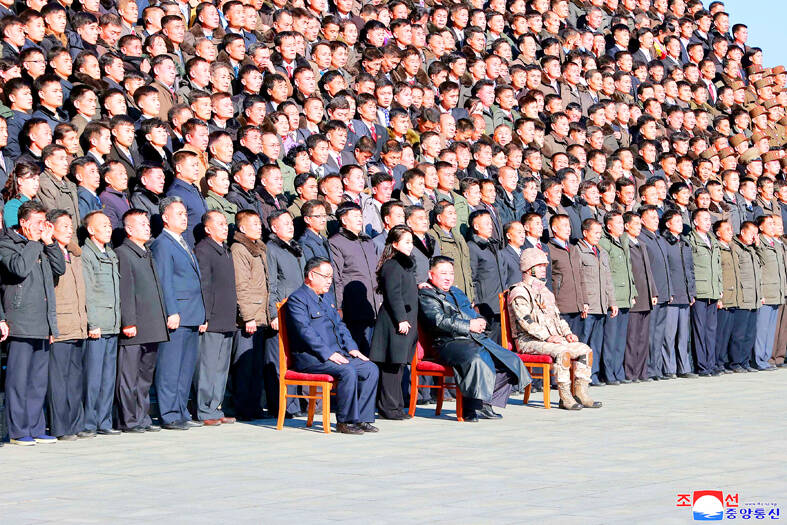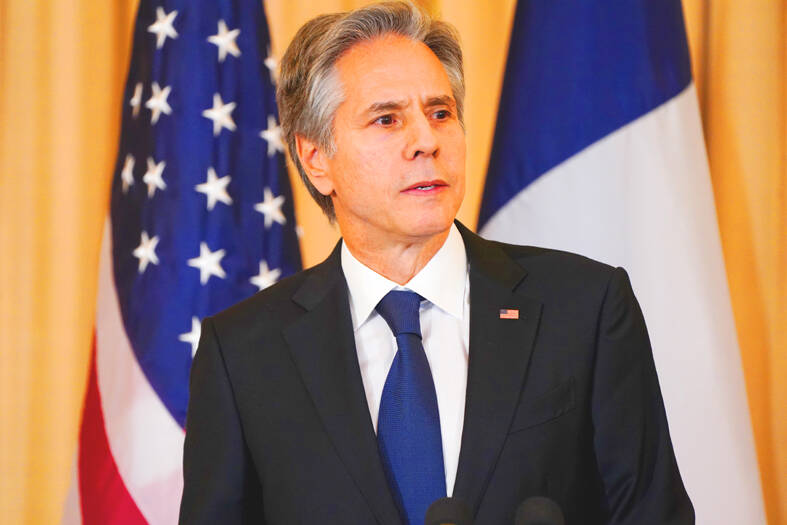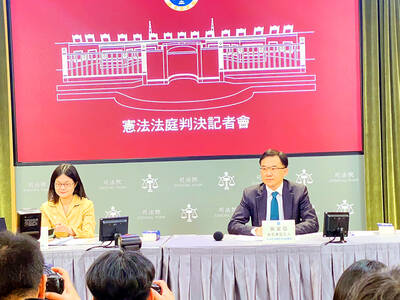The US, Japan and South Korea have imposed fresh sanctions on North Korean individuals and entities in response to Pyongyang’s recent slew of missile tests.
The US on Thursday blocked any assets of three North Korean officials in the US, a largely symbolic step against an isolated country that has defied international pressure over its weapons programs.
The US Department of the Treasury also threatened sanctions against anyone who conducts transactions with North Korean Lieutenant General Jon Il-ho, Workers’ Party of Korea munitions industry department head Yu Jin and North Korean army general political bureau head Kim Su-gil, who were identified as directly involved in weapons development.

Photo: REUTERS
North Korean missile launches since September, including the test of an intercontinental ballistic missile with the range to hit the US mainland, “pose grave security risks to the region and entire world,” US Secretary of State Antony Blinken said in a statement.
The sanctions “underscore our sustained resolve to promote accountability in response to Pyongyang’s pace, scale and scope of ballistic missile launches.”
The action was taken in coordination with US allies South Korea and Japan, Blinken said, adding that the EU in April issued similar designations of the three officials.

Photo: EPA-EFE
Tokyo and Seoul yesterday also announced new sanctions.
South Korea said it would target eight individuals, including a Taiwanese and a Singaporean national.
They have “contributed to North Korea’s nuclear and missile development and evasion of [pre-existing] sanctions,” the South Korean Ministry of Foreign Affairs said in a statement.
All are already subject to US sanctions, the ministry said, adding that South Korea’s new restrictions are expected to “alert the domestic and international community of the risks of transactions with these entities.”
Japan said that in response to Pyongyang’s “provocative acts,” it was freezing the assets of three North Korean companies — Korea Haegumgang Trading Corp, Korea Namgang Trading Corp and Lazarus Group — and one person, Kim Su-il.
The US has voiced frustration that China, North Korea’s closest ally, and Russia have blocked efforts at the UN Security Council to impose tougher sanctions.

The US government has signed defense cooperation agreements with Japan and the Philippines to boost the deterrence capabilities of countries in the first island chain, a report by the National Security Bureau (NSB) showed. The main countries on the first island chain include the two nations and Taiwan. The bureau is to present the report at a meeting of the legislature’s Foreign Affairs and National Defense Committee tomorrow. The US military has deployed Typhon missile systems to Japan’s Yamaguchi Prefecture and Zambales province in the Philippines during their joint military exercises. It has also installed NMESIS anti-ship systems in Japan’s Okinawa

TRAGEDY STRIKES TAIPEI: The suspect died after falling off a building after he threw smoke grenades into Taipei Main Station and went on a killing spree in Zhongshan A 27-year-old suspect allegedly threw smoke grenades in Taipei Main Station and then proceeded to Zhongshan MRT Station in a random killing spree that resulted in the death of the suspect and two other civilians, and seven injured, including one in critical condition, as of press time last night. The suspect, identified as a man surnamed Chang Wen (張文), allegedly began the attack at Taipei Main Station, the Taipei Fire Department said, adding that it received a report at 5:24pm that smoke grenades had been thrown in the station. One man in his 50s was rushed to hospital after a cardiac arrest

ON ALERT: Taiwan’s partners would issue warnings if China attempted to use Interpol to target Taiwanese, and the global body has mechanisms to prevent it, an official said China has stationed two to four people specializing in Taiwan affairs at its embassies in several democratic countries to monitor and harass Taiwanese, actions that the host nations would not tolerate, National Security Bureau (NSB) Director-General Tsai Ming-yen (蔡明彥) said yesterday. Tsai made the comments at a meeting of the legislature’s Foreign Affairs and National Defense Committee, which asked him and Minister of National Defense Wellington Koo (顧立雄) to report on potential conflicts in the Taiwan Strait and military preparedness. Democratic Progressive Party (DPP) Legislator Michelle Lin (林楚茵) expressed concern that Beijing has posted personnel from China’s Taiwan Affairs Office to its

‘ILLEGAL RULING’: The KMT and the TPP slammed the Constitutional Court judgement, saying it contravened the law and was trying to clear the way for a ‘green dictatorship’ The Constitutional Court yesterday ruled that amendments to the Constitutional Court Procedure Act (憲法訴訟法) passed by the Legislative Yuan last year are unconstitutional, as they contravene due legislative process and separation of powers. The Legislative Yuan on Dec. 20 last year passed amendments stipulating that no fewer than 10 grand justices must take part in deliberations of the Constitutional Court, and at least nine grand justices must agree to declare a law unconstitutional. The Executive Yuan on Jan. 2 requested that lawmakers reconsider the bill, but the Legislative Yuan, under a combined majority of Chinese Nationalist Party (KMT) and Taiwan People’s Party